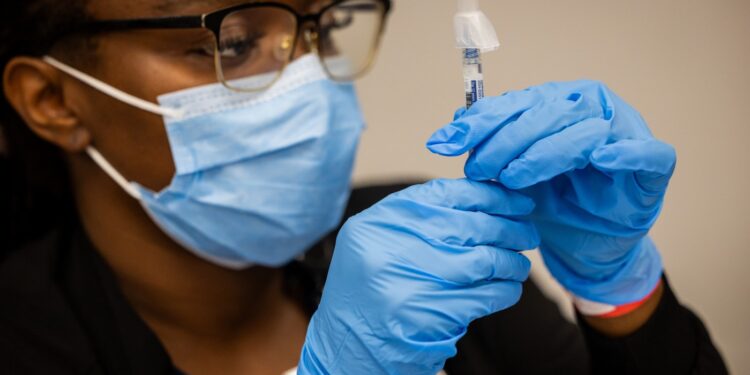
Despite most of the country — Illinois included — experiencing high numbers of respiratory illnesses, Naperville’s Edward Hospital has not seen an increase in flu, COVID-19 or RSV cases beyond what’s typical for this time of year, officials said.
Still, the Naperville campus is taking extra precautions by implementing stricter masking requirements for employees.
On Dec. 26, Edward’s parent system Endeavor Health directed team members to start wearing masks in all areas of inpatient hospitals providing patient care, according to a news release.
A rise in viral activity, in part, prompted the change, the release said. It also was spurred by a recommendation from the Illinois Department of Public Health in December for health care systems to take additional precautions to mitigate transmission, according to Endeavor.
For patients and visitors, masks are strongly recommended, officials said. They are required for anyone who is experiencing respiratory virus symptoms.
“Use common sense,” said Jonathan Pinsky, Edward’s medical director of infection control and prevention. “You know masking is required for team members caring for patients but for visitors, it’s completely optional. We just ask that you use common sense.”
Over the last few weeks, Edward Hospital has seen an increase in the number of patients hospitalized with the flu as well as patients continually coming in with COVID-19 infections and other viruses, such as RSV, Pinsky said.
As of Monday, about 20% of admissions had some type of respiratory illness, the majority with the flu, he said.
Seasonal RSV infections seem to have peaked in mid-December at Edward while COVID-19 cases have stayed relatively consistent, Pinksy said. With the flu, though, he expects activity to persist.
Last week, the hospital recorded more than 160 positive flu tests. That’s a jump from a few weeks prior, when the hospital was seeing 38 to 75 weekly positive tests, according to Pinsky.
Compared to last year, flu activity so far this season is peaking higher, he said. The increase, however, isn’t anything unexpected.
“Two years ago, we had one of our highest influenza years on record,” Pinsky said. “We haven’t seen anything like that this year so far.”
Consistent with Edward Hospital, respiratory illness activity levels across DuPage County also have been on the rise in recent weeks. Data from the week that ended Dec. 28, influenza activity in DuPage was high and increasing, COVID-19 activity was moderate and increasing and RSV activity was high and increasing.
The numbers have been climbing since late November to early December, according to the county health department.
Statewide, the respiratory illness level is high, according to the Illinois Department of Public Health. Across the country, the number of acute respiratory illness cases causing people to seek health care is high, the Centers for Disease Control and Prevention reported last week. As of the week that ended Dec. 28, the national test positivity rate for the flu was 18.7%, COVID-19 test positivity was 7.1% and RSV test positivity was 12.8%.
Respiratory illnesses aside, another seasonal malady that’s going around is norovirus, a nasty stomach bug that causes vomiting and diarrhea.
Edward Hospital has “seen a lot of norovirus in the last few weeks,” Pinsky said.
The state health department is in the process of evaluating preliminary reports of norovirus outbreaks, according to spokesman Michael Claffey. Initial analysis indicates that current norovirus cases are slightly above the levels seen in the years right before the pandemic, he said.
The pandemic years resulted in a drop in norovirus outbreaks because of increased hand hygiene precautions and limitations on social gatherings. It’s typical to see norovirus outbreaks around the winter, Claffey said. There is no vaccine or specific medical treatment for norovirus, he added, noting symptoms usually improve in one to three days.
Originally Published:







